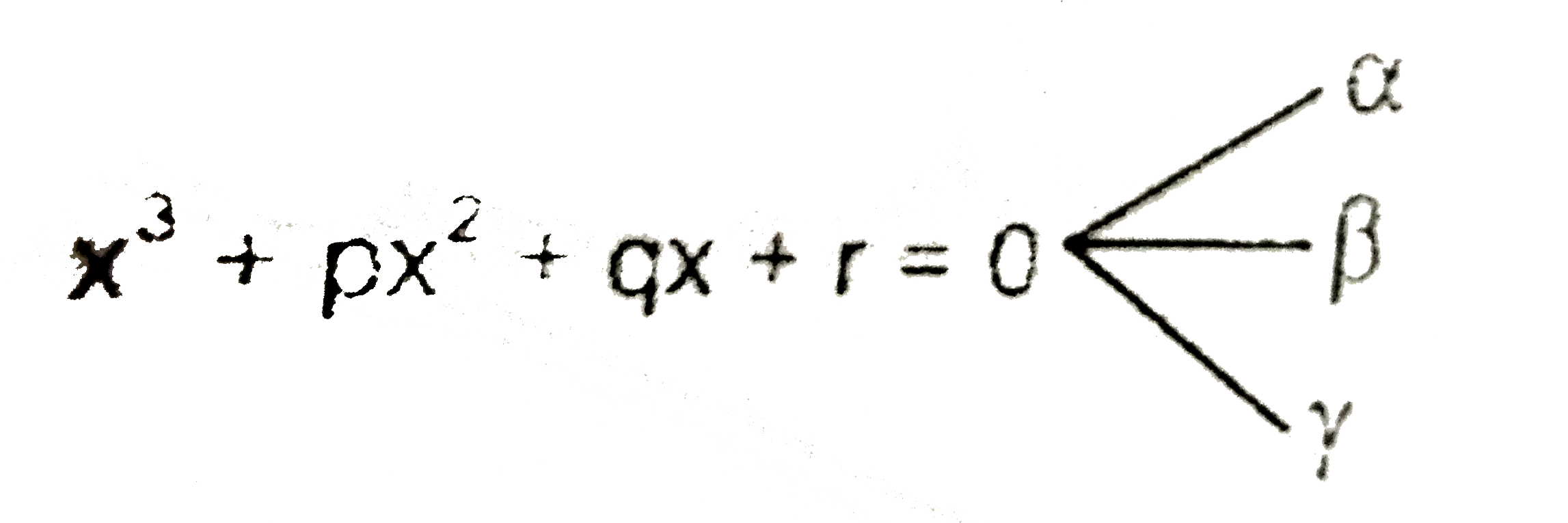If α,βγ are the roots of the equation x3+px2+qx+r=0, then (1−α2)(1−β2)(1−γ2) is equal to
(a) (1+q)2−(p−r)2 (b) (1+q)2+(p+r)2
(c) (1−q)2+(p−r)2 (d) none of these
(1+q)2)−(p+r)2
(1+q)2+(p+r)2
(1−q)2+(p−r)2
(1+r)2−(p+q)2
The correct Answer is:A
x3+px2+qx+r=0 
x3+px2+qx+r=(x−α)(α−β)(x−γ)=1+p+q+r…………1
pur x=−1
⇒−(1+α)(1+β)(1+γ)=−1+p−q+r……..2
Multiplying (1) & (2)
(1−α2)(1−β2)(1−γ2))={(1+q)+(p+r))((1+q)−(p+r)}
=(1+q)2−(p+r)2
Topper's Solved these Questions
Similar Questions
If a12+b12−c12=0, then the value of (a+b−c)2is:
(A) 2ab (B) 2bc (C) 4ab (D) 4acView SolutionIf α, β are the roots of 6x2−2x+1=0 and sx=αn+βn, then Ltn→∞n∑r=1sr is
(a) 517 (b) 0 (c) 337 (d) noneView SolutionIf α, β and γ are the zeroes of the cubic polynomial x3−5x2+2x−10, then the value of (α+β+γ)(1α+1β+1γ) is
(1) 2 (2) 0
(3) −1 (4) 1View SolutionIf pn+1=√12(1+pn), then
cos⎛⎜ ⎜⎝√1−p20p1p2p3...→∞⎞⎟ ⎟⎠
(a) 1 (b) −1 (c) p0 (d) 1p0 (e) None of theseView SolutionSum of the series 1+22x+32x2+42x3+.....→∞, |x|<1 is:
(A) 1+x(1−x)3 (B) 1−x(1+x)3
(C) 2+x(1−x)3 (D) 1−x(1+x)2View SolutionIf a+c+e=0 and b+d=0, then ax4+bx3+cx2+dx+e is exactly divisible by
(1) x+1 (2) x−1
(3) Both (1) & (2) (4) None of theseView SolutionIn an AP, Sp=q, Sq=p. Then Sp+q is equal to:
a. 0
b. −(p+q)
c. (p+q)
d. pqView SolutionIf ∫(1+xtanx)−2dx=1x+f(x)+c; then value of f(x) is
(1) xtanx (2) cotx (3) tanx (4) tan2xView SolutionFind the volume in cubic decimetre of each of the cubes whose side is (i)1.5m (ii) 75cm (iii) 2dm 5cm
View Solutionx=√p2+q2+√p2−q2√p2+q2−√p2−q2 then q2x2−2p2x+q2=?
(A) 3 (B) −1 (C) −2 (D) 0View Solution

